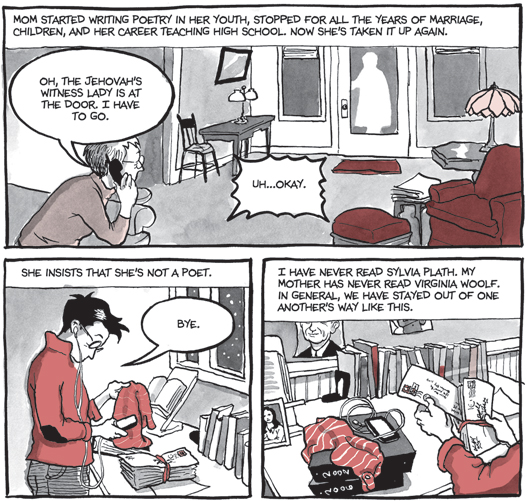I know I said I would have a post up last night, but I was too engrossed in last week's True Blood to write. Besides I had to catch up before tomorrow's episode. I did write most of this review yesterday though. By the way, look for lots of reviews in the coming days as I try to catch up before the semester begins on 8/29. On to the main event...
Are You My Mother? by Alison Bechdel is subtitled "A Comic Drama." It is the follow up to the critically acclaimed Fun Home, which I reviewed here. This time instead of recounting her relationship with her father, Bechdel goes into the much more complicated relationship with her mother. (And of course, the title is a play on the children's classic of the same name where a bird searches for its mother.) And instead of a color pallet of blue, white and black, Bechdel uses red, white, and black. Here is an example of her style, storytelling technique, and the color pallet:
I need to say right now that, much like with Fun Home, I really like how Bechdel keeps the color pallet minimized. Even with only the 1 main color, she is able to draw emotionally engaging pictures. Also by choosing a different color for Are You My Mother? she distinguishes the books from each other, while also pairing them as single color works. This is a great example of the extra level of enjoyment a graphic novel can add for the reader. When we are looking at the very best graphic novelists, they are able to use their pictures to tell the story as much as the words.
In terms of the story, itself, it definitely seems to flow less naturally from Bechdel. In fact, she alludes to the fact that she feels she might be trying too hard to tell the story of her relationship with her mother. But that is sort of the point. In an attempt to gain a closer relationship with her mother, Bechdel recounts her many years of therapy and her own search into the history of psychoanalysis. She struggles to improve their relationship, and we struggle along with her.
This work has a feminist theme which may draw in some readers or repel others. For me it was something I noticed, but since she carries it throughout, I felt like it worked. It was not preachy, and since it is a brand of feminism from the lesbian point of view, I felt reading it was a learning opportunity for me to see the world from a different viewpoint.
Like in Fun Home, here Bechdel also jumps around in time as she tells the story. I think it is more than last time though. To frame each new chapter, she starts with a dream. Then, the chapter comes from her analysis of that dream. This means the story flows from past to present, to middle of the story to back to present very fluidly. Again, with the pictures there to guide you, it is easier to follow along. Seeing how old or young Bechdel or her mother look helps you to "place" each section of the story. Without pictures, this storytelling technique could be a disaster. Kudos to Bechdel for using the illustrations to her advantage in her storytelling technique.
In lesser hands this could have become a whining, why me? tome; but Bechdel's willingness to bare her soul and her actions from the honorable to the detestable in equal measure, make this a book worth a look.
If you are looking for a layered, and complex story about a mother-daughter relationship, Are You My Mother? is a good choice. Bechdel digs deep into her soul and combines her art, love of literature, and intense faith in psychoanalysis to tell this excruciatingly personal story.
Three Words That Describe This Book: mother-daughter relationships, layered, emotionally charged
Readalikes: Bechdel mentions many of her creative inspirations for this graphic novel over and over again. Specifically, readers may want to read some Virginia Woolf or psychotherapist Donald Winnicot. Personally, I am not a fan of either person, but I skimmed those parts and got the gist of everything. I understand the point she is trying to make. Some readers though, may really want to pursue their work in great detail.
For memoirs about complicated mother-daughter relationships, I would suggest The Glass Castle by Jeannette Walls or Why Be Normal When You Can Be Happy? by Jeanette Winterson.
For more graphic novels, both fiction and nonfiction that are aimed at an adult audience, please consult this list I made. There is also this post where I linked to a graphic novel reading list for college students, but that list is not annotated.











No comments:
Post a Comment